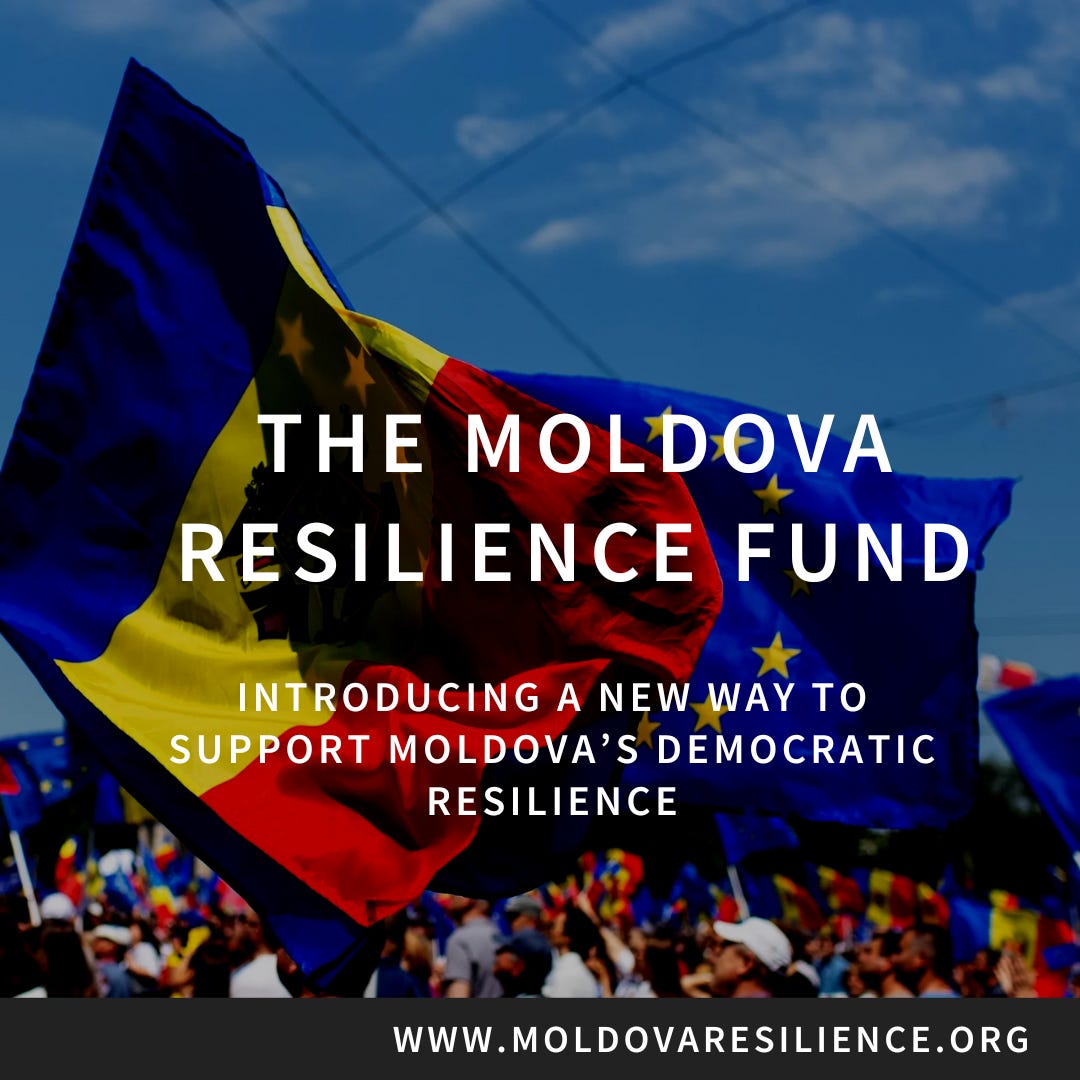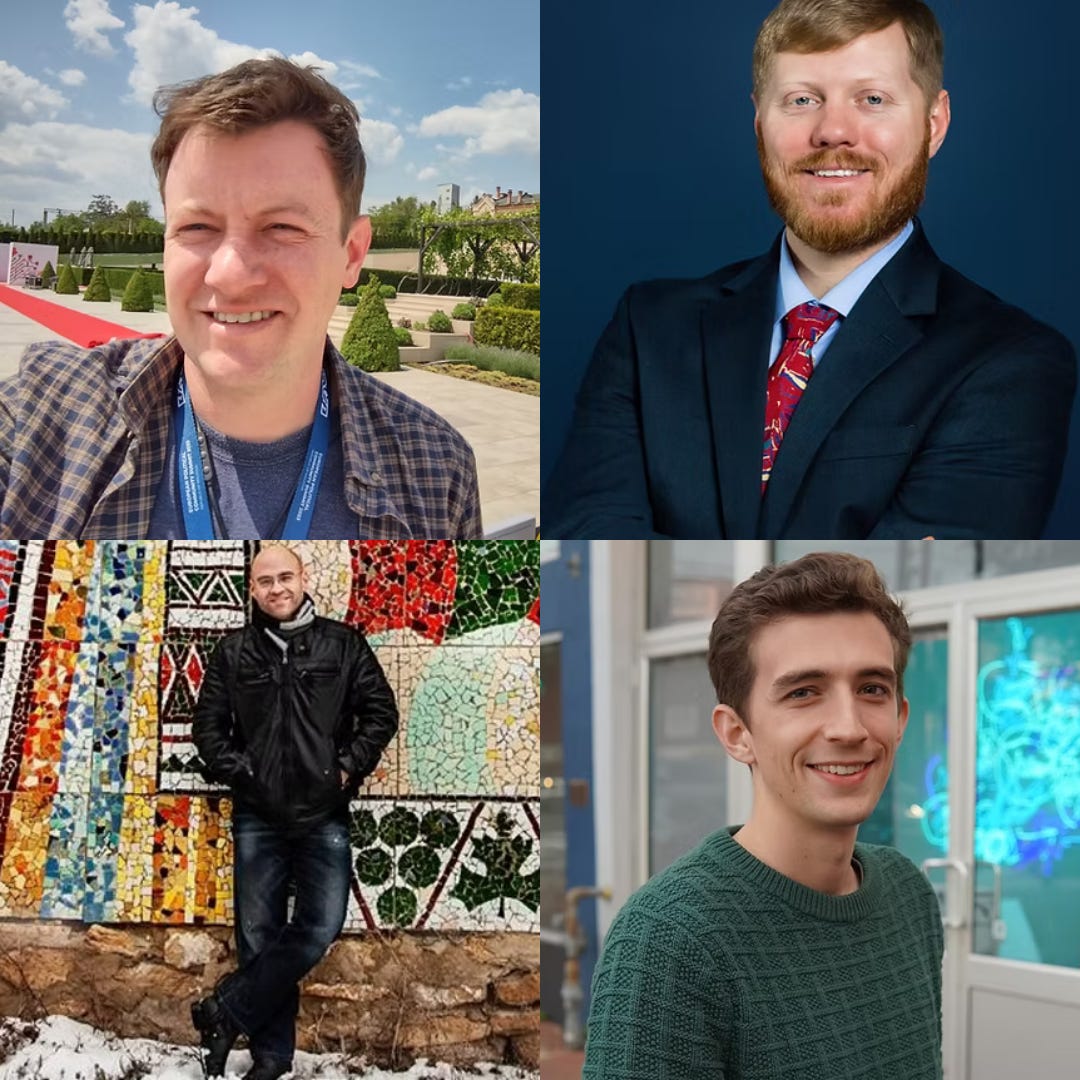Today I’m writing to share with you a new project - a US based 501c3 non-profit called the Moldova Resilience Fund. I am a co-founder of this organization, which seeks to support Moldovan civil society organizations and independent media in their struggle for an open, accountable and democratic society. If you believe that Moldova Matters, please read on to hear more about our work and how you can get involved.
After the outbreak of war in Ukraine, many of you would have seen emails from me explaining how you could get involved and support Ukrainian refugees. My restaurant became a volunteer run aid distribution center - one of hundreds of grass roots efforts across the country that sprang up and gave Moldova the name “A Small Country With a Big Heart.”
As you all know, this small country has come under unrelenting pressure in the last year as Russia’s hybrid attacks against Moldova’s democracy pushed the country to the brink. September’s parliamentary elections were a victory not only for Moldova’s European course, but for the huge number of independent journalists, activists, civil society organizations and motivated volunteers who pushed back on the propaganda and disinformation coming from the Kremlin.
While we rightly celebrated this victory, there is a darker reality underpinning this coalition of pro-democracy activists - there simply aren’t enough resources to keep up. With the destruction of USAID a huge amount of funding for civil society and independent, fact-based media, dried up. While most organizations and newsrooms have continued their important work, almost all have seen budget cuts and substantial layoffs. This situation is only getting worse - for many critical organizations this election may have been their last rodeo.
The European Union has stepped into the gap left by USAID, but there is only so much that they can do. There are still gaps, and it is more important than ever to fill them.
So today, I’m announcing that I’ve co-founded a new US based 501c3 non-profit called the Moldova Resilience Fund. In this email I’m going to share a bit about our new organization and how you can get involved.
Introducing the Moldova Resilience Fund
The origins of the Moldova Resilience Fund (MRF) go back to December 2024. The country was still reeling from the razor thin referendum on EU integration, and subsequent Romanian election disaster. We were only beginning to learn the scope of Russian attacks, but one thing was clear - undercover, investigative journalists played a critical role in thwarting these attacks.
I started meeting with the directors of independent news organizations to better understand their resource needs. I suspected that funding their work was difficult, but I had no idea how challenging it was. Most journalists went months without salaries as one grant ended and another started. The most resilient newsrooms self financed around 50% of their work. The least resilient relied on grants for 90%+ of their funding. In order to keep things running *basically* smoothly, management worked to diversify their funding sources as much as possible. In addition to advertising, subscriptions and local revenue, this meant applying for grants from multiple donors organizations. While the EU, and members states, were a part of this, in practice it often meant working with multiple US organizations - USAID projects, the National Endowment for Democracy (NED), etc. Even with these diverse funding sources times were very tough.
In parallel I started talking to American NGOs that raise money and support causes in Moldova. My initial thought was to support a fundraising project through an existing organization. From the Friends of Moldova, to the Moldova World Children’s Fund, to all the other major NGOs in this space, I got the same answer - we don’t work with media or civic groups. Their charters were clear - they supported charitable projects, but those other needs were left to governments.
Throughout winter I started thinking that there was an important gap here, but when USAID, NED and all other US donor organizations simultaneously ceased funding, things moved into crisis territory. Suddenly diversified funding across US government organizations was a liability. There was clearly a need for more support.
Over the course of the last year I’ve worked with a great team to build an organization that can be that support. Now, we’re officially launching the Moldova Resilience Fund - an NGO dedicated to raising money from individual donors (like you!) to support the Moldovans journalists, activists and organizations building a more resilient democracy.
Our Team
The Moldova Resilience Fund is run by a volunteer board of directors with extensive experience working with Moldovan civil society and independent media. Here’s the team:
David Smith (Co-Founder & Chair) - You should know who I am, but if not, check out my bio on Moldova Matters.
Clayton King (Co-founder & Treasurer) - Clayton is the Founding Director of the Alliance for Competitive Elections. He is a former Program Officer for Moldova with the International Republican Institute, where he administered grants and programming, including conducting election observation missions for the 2024 Moldovan Presidential Election and the 2025 Moldovan Parliamentary Election. He was also a Peace Corps Volunteer in Moldova (2017-2019) and holds a Master’s in Public Policy from the Korbel School of International Studies.
Lyndon Allin (Co-founder & Board Member) - Lyndon Allin is currently a Senior Advisor at CMI - Martti Ahtisaari Peace Foundation, focused primarily on CMI’s programs in Ukraine. From 2021-24 he served as Head of Investigations for VEON Group, a mobile telephone operator with operations in Ukraine, Central Asia, and other emerging markets. Prior to that, he was a Senior Associate with the law firm of Baker McKenzie in Washington. In 2011-16, he served as a US State Department secondee to OSCE missions in Moldova, where his portfolio included the “5+2” settlement process, and Ukraine, where he helped establish the Special Monitoring Mission and participated in negotiations in Donetsk Oblast which resulted in the release of 21 hostages in 2014. In 2010-13, he co-organized and participated in the Track 2 Transnistrian Conflict Resolution Task Force. He began his legal career with Skadden Arps in London and also practiced law with Akin Gump in Washington. Earlier in his career, Lyndon worked at the US Embassy in Chisinau in 2008-09 as an IREX Embassy Policy Specialist focused on Russia’s non-military means of influence in Transnistria and at Harvard’s Kennedy School in 2000-01 on the US-Russia National Security Project . He is a graduate of Duke University, Georgetown’s School of Foreign Service, and Georgetown Law, and is a member of the bar in New York State and the District of Columbia.
Mark Sawyer (Board of Directors) - Mark Sawyer is an open-source investigator and freelance journalist. To his friends, he’s “the Moldova guy.” His investigative work has focused on online narratives impacting trust in elections as well as foreign influence campaigns targeting communities in Europe, the United States, and Africa. He previously worked as a Program Officer at the International Republican Institute (IRI), where he designed and managed taxpayer-funded programs to support democracy in Moldova. He joined the Moldova Resilience Fund to support Moldova’s independent media and show the positive power that private networks of citizens can have apart from government funding.
Our Mission
Strengthening independent media & civil society in Moldova
The Moldova Resilience Fund supports independent media, civil society, and civic activism by providing flexible assistance to strengthen organizations and fill critical funding gaps. We work to promote press freedom, civic engagement, and democratic resilience in collaboration with local and international partners.
Our Philosophy - A Dollar isn’t a Dollar (or Euro)
Any economist will tell you that a dollar is fungible - anyone who runs an NGO dependent on fundraising will tell you that they aren’t. Every dollar counts, but the best dollars are timely and flexible.
The Moldova Resilience Fund isn’t going to replace big-dollar donors. What we can do is provide flexible, timely funding to the most critical needs. Our philosophy of support has 3 key points:
Quick decision making - We will not have long grant application processes with lots of paperwork. We aim to quickly deploy funding to help organization meet critical needs. In order to do this, we will focus on support to proven partners with impeccable reputations and a proven history of success.
We fund what others won’t - Major donors have *lots* of restrictions on how you spend their dollars or euros. Most want organizations that they fund to be “self sustainable,” but won’t fund positions and work critical to this - like ad sales, marketing or dedicated financial / fundraising teams. Our goal is to work with partners to fund what they need, not what a committee in DC or Brussels prioritizes. Sometimes that will be an investigation or fancy event. Often it will be something less glamorous but mission critical.
We work with local experts - All of our board members have extensive experience in Moldova, but we also know that there’s much we don’t know. Through our professional networks we will rely on local experts to advise on programming and how we can get the most out of every donor dollar. Our goal is to put local voices and expertise first every step of the way.
How You can Get Involved
I know that many readers will themselves have long experience with Moldova. If any of this resonates with you - please consider donating today. Whether it’s $5, $50 or $500 - every donation helps. The Moldova Resilience Fund is a registered 501c3 public charity in the United States. Donations are tax‑deductible as permitted by law.
You can support us today by going to www.moldovaresilience.org and clicking the “Donate” button at the top of the page (or by directly visiting our Givebutter page). You can also follow us on facebook or on linkedin.
Thank you,
David Smith
Editor’s Note: This project is entirely separate from Moldova Matters, which remains an independent and reader supported newsletter. Moldova Matters will not and cannot accept donations or advertising from MRF.




Fantastic initiative David!
That's an impressive collection of qualifications on the board.
I recall thinking during the most recent elections here, just how key investigative journalists were in identifying and documenting the many nefarious schemes for moving money illegally, and vote buying. It's an area where any state police department in the world struggles I think.
I'm particularly thinking of ZDG and Nokta - I took out a subscription to ZdG and donated at the time, but you make an excellent case for operating at a higher level.